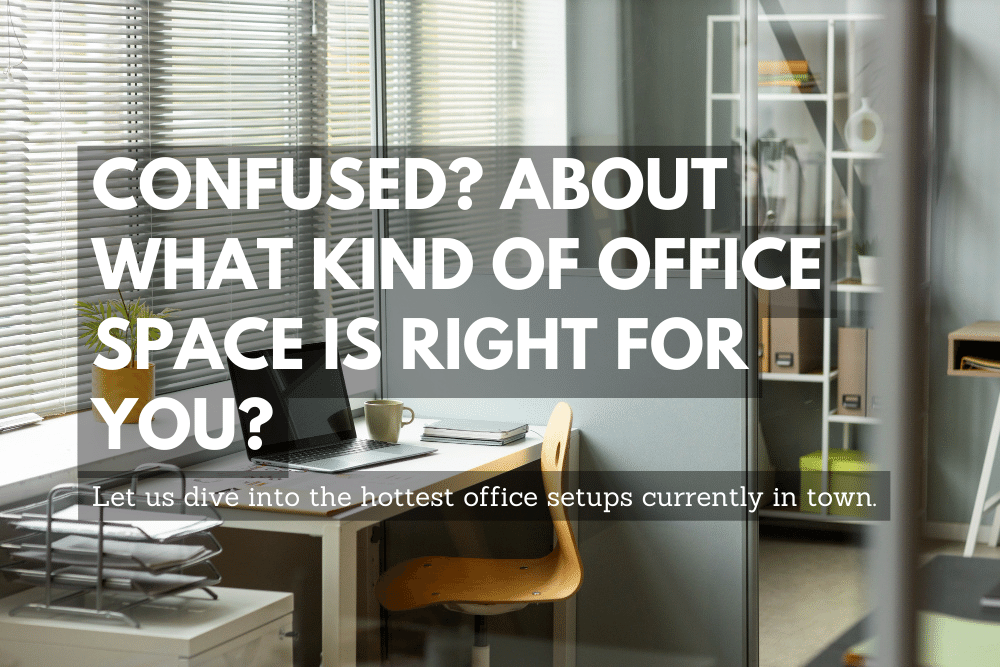Last Updated on January 6, 2025 by Joy Kyalo
If you are looking for cheap shared Startup Office Space in the East London and Essex area, then we have the one of the best packages and the ideal solution for you. Prices start from just £60 per month including VAT Check Here.
Are you confused about what kind of office space is right for you? Well, it needs a lot of thought because the options are endless (but mostly 5). Let us dive into the hottest office setups currently in town. The type of your business, the workforce, and the ambiance you want set for your office would finally help you decide which one of the below five you want to choose, or if you have a bit of a commitment issue, you can mix 2-3 types of set-ups for your office. So, let us dive in:
Hot-Desking
A modern workplace strategy involving employees sharing workstations is known as Hot-desking. This is a flexible way of working, and workplace arrangement promotes collaboration among team members. Hot-desking systems do not tie employees to a fixed desk, thus giving them room to move around based on workplace availability. This sneakily promotes timely coming into the office to choose the best and most preferred spot. Latecomers will have to stick with the least favourite spots. The interactive method and non-separation of teams based on departments and sections promote a collaborative mindset among employees. The learning experience and the networking one acquires through this simple shuffling-like system are quite impressive. However, the company needs to be incredibly careful and adequate when it comes to workplace infrastructure if everyone can do everything at every desk. Some might even miss the personal space and the familiarity and structure of a working mindset. Striking a balance between these two is especially important.
Co-Working
Co-working systems have become extremely popular in modern-day workspace choices. It increases collaboration, additionally providing an insight into a lot of people’s work lives, who, of course, are willing to share. These spaces are usually famous for accommodating several types of employees who opt out of traditional office setups, like freelancers and startups. Co-working space providers attract their clientele by offering impressive amenities that help the workers working there have a better workday, such as high-speed internet, comfortable seats, cafeterias, and communal areas for productive break times. This system advocates for a workplace culture that is different than a traditional school-like environment. It is set up with a belief that one does not need to be tied to a chair to work best, quite the opposite. When employees who are adults are freed from micromanagement, they will work best. Financially, it is also a clever idea for start-ups and freelancers who are not yet ready to commit to a physical space and its lumpsum amount of rent.
Fixed Desk
The fixed desk showcases a cornerstone in the modern workplace setting, providing a sense of privacy and stability for employees. Workstations or desks are one place in an employee’s workplace or office, which can be called their own. It is stable and personalized according to the employee’s needs. Most of the time, the workstations or desks show the commitment of the employee towards the company and vice versa. It also becomes a fixed and known point of contact for the employee and their team members, making them easy to locate and approachable as well as available. Practically, if a company is able and willing to pay or invest in real estate as their office, a fixed desk approach can prove effective as it will segregate departments. This segregation can prove beneficial if the company has more than one kind of product or service to offer that needs different sets of skilled employees.
Sublets & Shared Offices
Sublets or shared offices fall under a legal technicality where a primary leaseholder sublets his occupied amount of square footage. This helps in two aspects of the business: the cost burden of the primary leaseholder is shared. In contrast, the secondary leaseholder gets a workspace at a discounted rate, eliminating the primary cost and structural investments as well as the long-term commitment the primary leaseholder made. Shared offices involve more than one business or company where the businesses may be of a similar kind or completely different. It can be an accounting strategy on the part of the primary leaseholder, where the secondary leaseholder is their own child company or their second company. However, most commonly, it is seen in two different companies, and their owners work in complete harmony as well as privacy. Startups and mid-cap companies prefer this arrangement most. It is also a wonderful way for bankrupt companies to revive a bit of their money by subletting their workspace.
Dedicated Offices
Dedicated offices are an age-old system of working environment, which has been proving itself effective even in this age of shared and communal workspace. A primary reason for this is that some offices cannot function without offices that would provide a completely distraction-free and confidential environment. Though quite low in number, not all positions and employees need collaborative efforts to accomplish their tasks. Privacy and confidentiality are a big requirement for some positions; for example, a senior partner at a law firm would prefer to keep their client’s secrets to themselves. An editor of a news outlet may not want to leak their exclusive news piece to freelancers of their company who work even with their competitors.
With that, we end our venture with the various kinds of office setups that modern-day folks are using and successfully setting up huge businesses. The only requirement is knowing your work and workforce and choosing the best possible setup.
Read Also:
- Everything You Need to Know About Companies House Default Address
- What is a Dormant Company? (A Complete Guide)
- What Expenses Are Claimable When Working From Home?
- Understanding the Importance of a Tax Identification Number in the UK
- Top 5 Businesses with Low Failure Rates You Can Start Today
- Preference Shareholders vs. Ordinary Shareholders: What’s the difference?
- What are the Advantages and Disadvantages of being VAT Registered?
- How Using a Professional Business Address Service Can Help Boost My Business in the UK
- Should I Use My Home Address When Registering and Running My Business?

The BusinAssist Editorial Team has 15+ years of experience writing about small business and company formation in the UK, Canada, and the USA. We simplify complex processes and provide practical insights to help entrepreneurs succeed. Business Assist with BusinAssist – your partner for business success.
